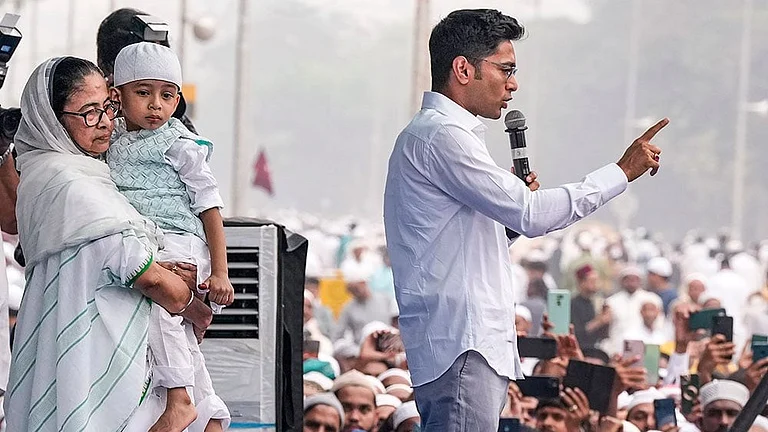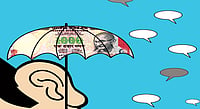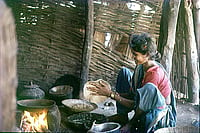Corpses, cloth stained with menstrual blood, excrement, carcasses of dead animals—this age-old list of polluting things that require ritually prescribed disposal now includes the detritus of modern consumerism and industrial manufacture. Radioactive waste, industrial effluents, product packaging and cast-off computers figure among the fast-multiplying discards of contemporary India. But though materials change, the men, women and children who manage our mountains of waste remain the same and so does their position in the social hierarchy. Even as old-style pollution continues to be dealt with by social groups—Dom, Dhobi, Bhangi, Chamar—consigned to the bottom by a caste society that stigmatises their work and their persons, the trash-heaps of India Shining emerge as the new commons from which Dalit communities glean a living.
As Of Poverty and Plastic, Kaveri Gill’s informative book on the plastic recycling trade in Delhi, points out, dealing with other people’s shit has always been low-status work, yet there are grades of low-ness depending on the degree of pollution involved. The traditional metric is a durable one and it stretches to accommodate modern objects and activities. Thus, the kabaadias who deal in ‘dry’ waste—newsprint, bottles, scrap metal—belong to a higher Dalit jati than the scavenger who picks through the ‘wet’ waste of neighbourhood dalaos (rubbish pits). The status difference extends to plastics as well: in Gill’s study, those who retrieve used pannis (polythene bags) and other recyclables from roadsides and rubbish heaps were all Balmiki/Bhangi and were regarded as lower than the Khatik who dealt in dry scrap. While caste hierarchy no doubt explains how a large part of Delhi’s waste collection is structured, one wonders about the increasing presence of Bangladeshi workers on its bottom rung, indicating a low status based not on caste but on lack of citizenship and assets.
Scavenging, sorting and recycling are dirty, risky jobs. But they are as essential to cities as the vultures that feed on carrion in the countryside. Just like the vultures, the people who perform these crucial services are regarded with disgust. They are harassed by the police and middle-class Resident Welfare Associations. Their markets are summarily displaced to the outskirts of the city. And, ironically, the recycled goods they help produce—inexpensive bags, along with shoes, toys, and household items—are labelled ‘environmentally unsafe’. Yet it is this recycling industry that is helping save the earth. If it were not for the labour of millions of poor people, we would be drowning in a sea of solid waste. Chintan, a Delhi ngo that works with waste-pickers, has shown how recycling contributes to lowering carbon emissions by reducing the demand for ‘virgin’ products. By organising and training waste-workers, giving them identity cards and uniforms, Chintan may not have succeeded in increasing their incomes but it has given them izzat, a major achievement in the context of the concerted prejudice and hostility that they encounter from state and society.
Gill’s book highlights the enterprising and innovative qualities of plastic recyclers and their efforts to leverage their shared caste identity through electoral politics in Outer Delhi. However, their efforts to secure a foothold in the urban economy come up against a city seeking ‘world-class’ status which has no room for the poor. Instead of facilitating waste recovery and recycling—the win-win solution in terms of employment and the environment—the industry is being squeezed out of the city. Yet, besides valuing the work of scavengers, we also urgently need to reduce our waste stream. Especially worrying is the proliferation of non-degradable materials such as the metallised polymer films used to make airtight snacks, juice and gutka packaging. As consumers, we could be doing a lot more for the environment: for some of us, our personal contribution to the war against waste is composting. When the sweeper rings my doorbell, he gets only paper and plastic; all the biodegradable waste is recycled at home. If more people did this, our landfill mountains would shrink into molehills.
Written by a development economist, Of Poverty and Plastic represents a refreshing approach within the discipline, studying ground realities and finding that key concepts and models do not apply. Amartya Sen’s capability approach and New Institutional Economics both screech to a halt when confronted with the complexities of caste and class, and entrenched inequalities. The book’s strength is that it incorporates elements from political science and sociology into economic theory, helping us appreciate the importance of a despised and oppressed urban underclass.

























